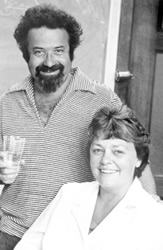

|

|
IN MEMORIAM
Robert I. Mishell
Professor of Immunology, Emeritus
UC Berkeley
1934 – 2008
Robert Isaac Mishell died of heart failure in San Francisco on March 6, 2008.
Bob Mishell made a seminal contribution to cell biology when, in collaboration with Richard Dutton in 1966, he developed conditions for generating a primary immune response in vitro. Mishell and Dutton added sheep red blood cells to spleen cells in culture and could chart the emergence of cells that secreted anti-red cell antibodies to form hemolytic plaques. This opened the way to studies in a multitude of research laboratories on the various classes of cells that interact, the cellular and molecular factors that activate, suppress or otherwise regulate immune responses. Some of the most important experiments revealing the role of T and B lymphocytes, macrophages and dendritic cells in immunity were inspired or facilitated by the power and versatility of the Mishell-Dutton system as adapted over more than two decades. There is a voluminous and growing literature on applications of the Mishell-Dutton method to the testing and examination of the physiological effects of drugs, toxins, microorganisms and metals.
Mishell was born May 18, 1934, grew up in Los Angeles and graduated from Stanford University in 1955 with a B.A. and in 1958 with an M.D. After his internship at the University of California, Los Angeles (UCLA) and residency at Stanford, he accepted a succession of fellowships, including two with the National Cancer Institute in Bethesda, Maryland, and one with the Scripps Clinic in La Jolla, California. He joined the University of California, Berkeley, faculty as an assistant professor in the Department of Microbiology and Immunology in 1968 and became a professor in 1976.
Mishell’s research focused on identifying factors and molecules that have a regulatory effect on the immune response. He and his wife, Barbara Mishell, made their laboratory and their home lively centers of inquiry and training for dozens of undergraduate and graduate students and technicians. The Mishells, with Stan Shiigi, edited a wide-ranging book of Selective Methods in Cellular Immunology (Freeman, 1980). Bob was particularly effective in teaching students how to think critically about published papers, a quality in which he excelled. Bob and Barbara were dedicated to expanding opportunity in education and science, and they attracted many young people of color and from disadvantaged backgrounds to careers in biological science or medicine.
Bob was deeply involved in issues of humanitarian and social conscience. As a young physician he was instrumental in rallying nationwide support among doctors for the enactment of Medicare. Later he was a member of Physicians for Social Responsibility and an active participant on issues ranging from opposition to the Vietnam War to famine relief in Africa.
Bob made his many outstanding contributions at UC and in the general community despite a difficult affliction with a bipolar disorder. His son, Dr. Jacob Mishell, has pointed out that this illness was diagnosed and treated properly only after many years of suffering and disability.
In 1988, a great tragedy befell Bob and Barbara Mishell. They were bludgeoned brutally by a violent and deluded contractor, who later murdered and beheaded a potential witness. Bob eventually recovered from a fractured skull, but Barbara was terribly injured and permanently disabled physically and mentally. Bob retired in 1988 and devoted the remaining years of his life completely to the care of Barbara. He refused to follow medical advice that Barbara needed to be placed in an institution. Under his insightful and remarkably devoted care, she was able to regain significant ambulatory ability, comprehension and artistic expression despite the virtual absence of speech.
Professor Mishell is survived by his wife of 44 years, Barbara; his son, Jacob; his brother, Daniel Mishell Jr.; and two grandchildren, Rebecca and Isaac.
Colleagues, students and friends of Bob Mishell remember and celebrate an extraordinary life. We miss his enthusiasm, curiosity, and ethical integrity in matters of science and social justice. We honor the compassion and creativity with which he persevered courageously over uncommon adversity.
Leon Wofsy
Claudia Henry